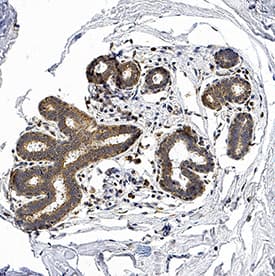Human Ephrin-A4 Antibody
R&D Systems, part of Bio-Techne | Catalog # AF369


Key Product Details
Species Reactivity
Validated:
Cited:
Applications
Validated:
Cited:
Label
Antibody Source
Product Specifications
Immunogen
Leu26-Gly171
Accession # P52798
Specificity
Clonality
Host
Isotype
Scientific Data Images for Human Ephrin-A4 Antibody
Ephrin‑A4 in Human Mammary Glands.
Ephrin-A4 was detected in immersion fixed paraffin-embedded sections of normal human mammary glands using Goat Anti-Human Ephrin-A4 Antigen Affinity-purified Polyclonal Antibody (Catalog # AF369) at 3 µg/mL for 1 hour at room temperature followed by incubation with the Anti-Goat IgG VisUCyte™ HRP Polymer Antibody (Catalog # VC004). Tissue was stained using DAB (brown) and counterstained with hematoxylin (blue). Specific staining was localized to cytoplasm and plasma membrane of glandular epithelium. View our protocol for IHC Staining with VisUCyte HRP Polymer Detection Reagents.Ephrin‑A4 in MCF‑7 Human Cell Line.
Ephrin-A4 was detected in immersion fixed MCF-7 human breast cancer cell line using Goat Anti-Human Ephrin-A4 Antigen Affinity-purified Polyclonal Antibody (Catalog # AF369) at 5 µg/mL for 3 hours at room temperature. Cells were stained using the NorthernLights™ 557-conjugated Anti-Goat IgG Secondary Antibody (red; Catalog # NL001) and counterstained with DAPI (blue). Specific staining was localized to plasma membrane. View our protocol for Fluorescent ICC Staining of Cells on Coverslips.Applications for Human Ephrin-A4 Antibody
Immunocytochemistry
Sample: Immersion fixed MCF-7 human breast cancer cell line
Immunohistochemistry
Sample: Immersion fixed paraffin-embedded sections of normal human mammary glands
Western Blot
Sample: Recombinant Human Ephrin-A4 Fc Chimera (Catalog # 369-EA)
Reviewed Applications
Read 1 review rated 5 using AF369 in the following applications:
Formulation, Preparation, and Storage
Purification
Reconstitution
Formulation
Shipping
Stability & Storage
- 12 months from date of receipt, -20 to -70 °C as supplied.
- 1 month, 2 to 8 °C under sterile conditions after reconstitution.
- 6 months, -20 to -70 °C under sterile conditions after reconstitution.
Background: Ephrin-A4
Ephrin-A4, also known as LERK-4 and EFL-4, (1) is a member of the ephrin ligand family which binds members of the Eph receptor family. All ligands share a conserved extracellular sequence, which most likely corresponds to the receptor binding domain. This conserved sequence consists of approximately 125 amino acids and includes four invariant cysteines. The A-class ligands have a GPI anchor following the conserved sequence. Ephrin-A4 has been shown to bind EphA2, EphA3, EphA4, EphA5, EphA6, EphA7, and EphB1 (2, 3). The extracellular domains of human and mouse Ephrin-A4 share 80% amino acid identity. Only membrane-bound or Fc-clustered ligands are capable of activating the receptor in vitro. While soluble monomeric ligands bind the receptor, they do not induce receptor autophosphorylation and activation (2). In vivo, the ligands and receptors display reciprocal expression (3). It has been found that nearly all receptors and ligands are expressed in developing and adult neural tissue (3). The Eph/ephrin families also appear to play a role in angiogenesis (3).
References
- Eph Nomenclature Committee [letter] (1997) Cell 90:403.
- Flanagan, J.G. and P. Vanderhaegen (1998) Annu. Rev. Neurosci. 21:309.
- Pasquale, E.B. (1997) Curr. Opin. Cell. Biol. 9:608.
Alternate Names
Gene Symbol
UniProt
Additional Ephrin-A4 Products
Product Documents for Human Ephrin-A4 Antibody
Product Specific Notices for Human Ephrin-A4 Antibody
For research use only
